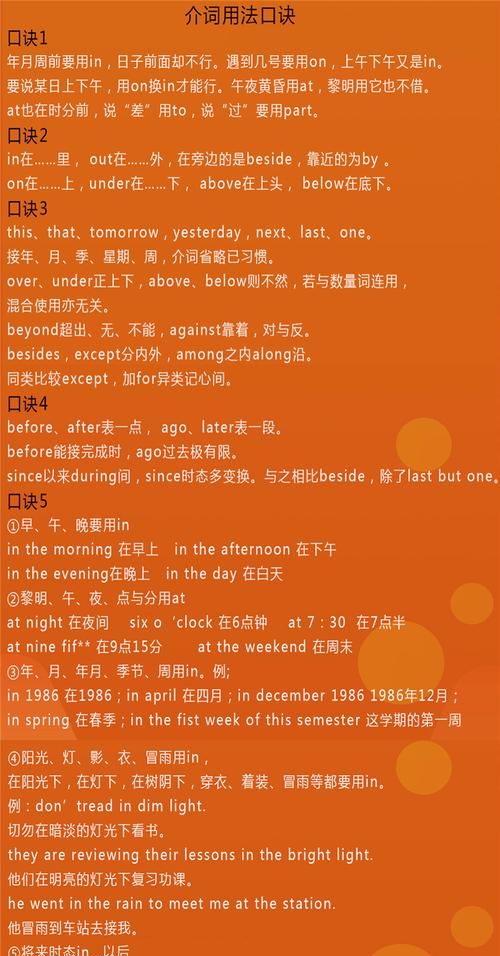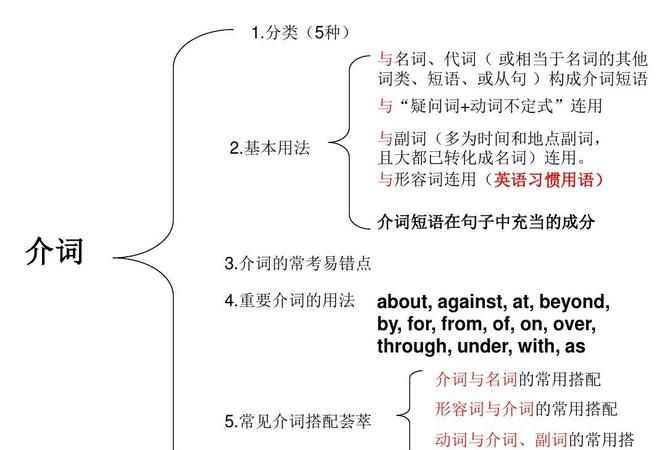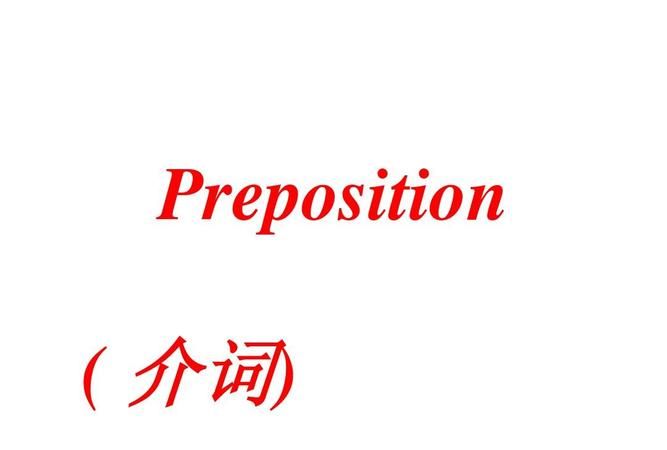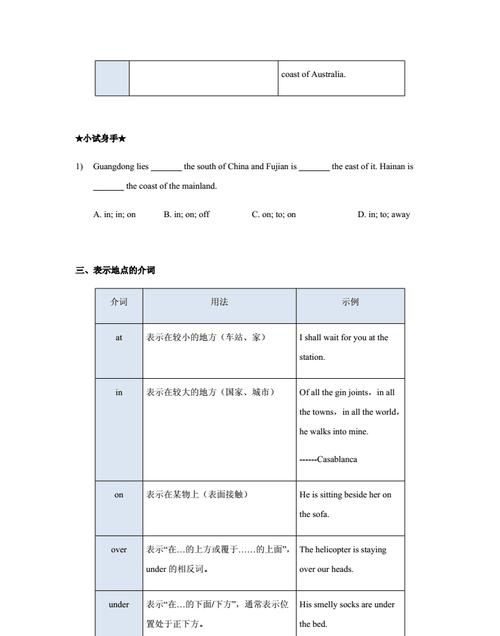本文目录
高中英语介词短语用法最全总结
【文章导读】介词短语,是介词和其它代词或名词或词组搭配形成的短语。口语上简称“介短”。该短语主要是用来表示词与词, 词与句之间的关系。 下面是关于高中英语介词短语的用法 ,欢迎阅读参考!
1介词的搭配与选择
介词不能在句子中独立充当一个成分,而需要与其后面的宾语相结合,成为介词短语,在句中充当一个成分。所以选用什么介词要根据其后面所接的宾语而定。但是,有时介词也受其前面用词的限制,因此,许多情况下也应根据介词前面的词选用相应的介词。
2介词的语法 功能
介词与其他词类或成分结合后方能在句子中充当语法成分,构成介词短语。介词短语可以作定语(须后置)、状语、表语、宾语补足语等。例如:
The skyscraper in the distance is a five-star hotel. (定语)
They play football in spite of the rain. (状语)
The decision is of great importance to me. (表语)
They found the machine in a bad state. (宾语补足语)
3介词的分类
英语常用的'介词大致可分为四类:
1) 简单介词
顾名思义,简单介词是指由一个单词构成的介词,也是使用最频繁的一类介词,常用的有:at,about,above,across,after,among,against,before,behind,below,beside,between,beyond,but,despite,during,except,for,in,of,on,over,near,past,round,since,through,till,until,with,up等。
2) 合成介词
指由介词+其他介词或副词构成的介词,常用的合成介词有:inside,into,onto,outside,throughout,within,without等。
3) 二重介词
指由两个单一的介词并列在一起,作为一个介词使用并表达一个完整意思的介词,常见的二重介词有:from among,from behind,from under,until /till after等。
4) 短语介词
短语介词是指由短语构成的介词,常用的有:according to,because of,in spite of,on behalf of,with reference to等。短语介词与介词短语不同。短语介词是由短语构成的介词,不可独立使用,本身不能作句子成分,后面要跟名词、动名词或代词等;介词短语是由介词加宾语构成,本身可作句子成分,如定语或状语等,可单独使用。
4介词的宾语
介词的宾语可以是名词、代词或动名词等。例如:
名词:The car ran into a wall, and two men were killed.
代词:Wherever he went, he carried the photo with him.
形容词:Your plan is far from perfect.
副词:I can’t see the tower clearly from here.
动名词:He entered the room without taking off his hat.
5介词短语的句法 功能
1. 作定语 The key to the door is missing.
2. 作表语 As we know, Japan is to the east of China.
3. 作状语
1) On Sundays, the family are mostly out. (时间状语)
2) On top of the hill stands a TV tower. (地点状语)
3) All the work must be done by hand. (方式状语)
6with的复合结构
1) with+宾语+形容词
He is used to sleeping with all the windows open.
2) with+宾语+分词
The wounded boy glared at the nobleman with his teeth clenched.
3) with+宾语+不定式
With so much homework to do, I can’t go to the party.
4) with+宾语+介词短语
The teacher entered the classroom with a book under his arm.
7介词的固定搭配
在英语中固定搭配的介词词组和短语介词很多,平时需要加强记忆。此处讲解几个常见的动词与介词的固定搭配。
1. act as 担任 act for 代理
2. apply to 应用于,适合于,向……申请 apply for 申请,要求
3. belong to 属于 belong with 应归于(类别,范畴等)
4. call on 号召,请求,拜访 call at 探访(at后接地方)
call in 请医生,召集,收集
5. compare with 跟……相比较 compare to 把……比作,与……相比
6. deal in 买卖(某一产品),经营 deal with 对付,解决
7. play with 玩(某物) play at玩(某种游戏)
8. wait on 伺候 wait for等待
8误区提醒
1. 一些介词的基本用法不清;2. 一些多义介词的用法弄混;3. 一些介词短语不会灵活运用。
【典型例题】
1. Would you mind not picking the flowers in the garden? They are ____ everyone’s enjoyment.
A. in B. at C. for D. to
解析:for everyone’s enjoyment意为“为了大家欣赏”,for在此处为基本用法,但受to one’s joy的影响错选成to。正确答案为C。
2. So far, we have done a lot to build a low-carbon economy, but it is ____ ideal. We have to work still harder.
A. next to B. far from C. out of D. due to
解析:next to挨着;far from远非;out of 出于;due to 因为。根据句意,空格处是要表达“但还很不理想”的意思。故正确答案为B。

英语常用介词的用法归纳
1.表示地点位置的介词
1)at ,in, on, to,for
at (1)表示在小地方; (2)表示“在……附近,旁边”
in (1)表示 在大地方; (2)表示“在…范围之内”。
on 表示毗邻,接壤,“在……上面”。
to 表示在……范围外,不强调是否接壤;或“到……”
2)above, over, on 在……上
above 指在……上方,不强调是否垂直,与 below相对;
over指垂直的上方,与under相对,但over与物体有一定的空间,不直接接触。
on表示某物体上面并与之接触。
The bird is flying above my head.
There is a bridge over the river.
He put his watch on the desk.
3)below, under 在……下面
under表示在…正下方
below表示在……下,不一定在正下方
There is a cat under the table.
Please write your name below the line.
4)in front [frant]of, in the front of在……前面
in front of…意思是“在……前面”,指甲物在乙物之前,两者互不包括;其反义词是behind(在……的后面)。
There are some flowers in front of the house.(房子前面有些花卉。)
in the front of 意思是“在…..的前部”,即甲物在乙物的内部.反义词是at the back of…(在……范围内的后部)。
There is a blackboard in the front of our classroom.
我们的教室前边有一块黑板。
Our teacher stands in the front of the classroom.
我们的老师站在教室前.(老师在教室里)
5)beside,behind
beside 表示在……旁边
behind 表示在……后面
编辑本段2.表示时间的介词
1)in , on,at 在……时
in表示较长时间,如世纪、朝代、时代、年、季节、月及一般(非特指)的早、中、晚等。
如 in the 20th century, in the 1950s, in 1989, in summer, in January, in the morning, in one’s life , in one’s thirties等。
on表示具体某一天及其早、中、晚。
如on May 1st, on Monday, on New Year’s Day, on a cold night in January, on a fine morning, on Sunday afternoon等。
at表示某一时刻或较短暂的时间,或泛指圣诞节,复活节等。
如at 3:20, at this time of year, at the beginning of, at the end of …, at the age of …, at Christmas, at night, at noon, at this moment等。
注意:在last, next, this, that, some, every 等词之前一律不用介词。如:We meet every day.
2)in, after 在……之后
“in +段时间”表示将来的一段时间以后;
“after+段时间”表示过去的一段时间以后;
“after+将来的时间点”表示将来的某一时刻以后。
3)from, since 自从……
from仅说明什么时候开始,不说明某动作或情况持续多久;
since表示某动作或情况持续至说话时刻,通常与完成时连用。since表示"自(某具体时间)以来",常用作完成时态谓语
的时间状语。
since liberation(1980)自从解放(1980年)以来 They have been close friends since childhood.
他们从小就是好朋友。 (1)since the war是指"自从战争结束以来",若指"自从战争开始以来",须说"since
the beginning of the war"。
(2)不要将since与after混淆。
比较:He has worked here since 1965.(指一段时间,强调时间段)自从1965年以来,他一直在这儿工作。
He began to work here after 1965.
(指一点时间,强调时间点)从1965年以后,他开始在这儿工作。
4)after, behind 在……之后
after主要用于表示时间;
behind主要用于表示位置。
时间名词前介词用法口诀
年前周前要用in
具体日子要用on
遇到几号也用on
上午下午得是in
要说某日上下午
用on换in记清楚
午夜黄昏用at
黎明用它也不错
at用在时分前
说“差”可要用上to
说"过''要用past
编辑本段3.表示运动方向的介词:
across, through 通过,穿过
across表示横过,即从物体表面通过,与on有关,为二维
through穿过,即从物体内部穿过,与in有关,为三维。
编辑本段4.表示“在……之间”的介词:
表示“在……之间”的介词在英语中属于方位介词,如in front of ,behind ,on, in, near, under, up
between, among
between指在两个人或两个事物之间;
among指在三个或三个以上的人或事物之间。
编辑本段5.表示其他意义的介词
1)on ,about 关于
on 表示这本书,这篇文章或演说是严肃的,或学术性的,可供专门研究这一问题的人阅读;
about表示内容较为普通,不那么正式。
2)by, with, in 表示方法、手段、工具
by 以……方法、手段或泛指某种交通工具;
with 表示用 …工具、手段,一般接具体的工具和手段;
in 表示用…方式,用…语言(语调、笔墨、颜色)等;
3)except, besides 除了
except 除……之外,不包括在内;
besides 除……之外,包括在内。
Except for Mr. Wang, we went to see the film.(王先生没去)
Besides Mr. Wang, we also went to see the film.(王先生也去了)
27)near 靠近....。
There are some flowers near the house.
房子附近有一些花。
28)of ...的,属于...。
This is a map of China.
这是一张中国地图。
29)off 离开...,在...之外。
The young man got off the train quickly.
那个年青人很快下了火车。
I live in a village a little way off the main road.
我住在离大路不远的一个村庄里。
30)on 在...之上。
My book is on the table.
我的书在桌子上。
31)out of 从...出来,在...之外。
The dog run out of the house.
狗从房子里跑出来。
32)outside ... 外边.
They are waiting outside the gate.
他们在门外等着。
33)over 在...之上,遍于...之上,越过...。
There is a light over the desk.
桌子上方有盏灯。
He is over sixty years old.
他有六十多岁。
34)past 越过...,过...,超越...。
The students walked past the post office.
学生们走过了邮局。
It is ten past two.
现在是两点十分。
35)round 围着...,绕过...,在...周围。
We sat round the table.
我们围着桌子坐下。
The earth goes round the sun.
地球绕着太阳转。
36)since 自... 以后,自...以来。
He has made great progress in English since he came into the college.
从他来到大学后,他的英语有了很大进步。
37)through 经过...,穿过...。(立体层面)
They went through the forest.
他们穿过了森林。
38)throughout 遍及...,在各处。
The police searched for the criminal throughout the mountain.
警察搜山寻找犯人。
39)till 直到...,在...以前。
He didn't come back till eleven o'clock.
他直到十一点钟才回来。
We'll be home till six.
六点以前我们都会在家。
40)to 到...,向...,趋于。
How long is it from here to the station?
从这儿到车站有多远?
41)under 在...之下,低于。
There are some footballs under the bed.
床底下有几颗足球。
These students are under seventeen years old.
这些学生们不到十七岁。
42)until 直到,在...以前,
Please wait for us until we come back.
请等着我们回来。
It was not until last week that I handed in mathematics paper.
直到上周,我才交了数学论文。
43)up 在...上面,在...上。
He went up the stairs.
他上了楼梯。
44)upon 在...之上,迫近...。
It's not polite to look down upon him.
蔑视他是不礼貌的。
45)within 在...之内。
You must finish the work within two weeks.
你必须两周内完成这项工作。
46)without 没有,不,在...之外。
We can't do it better without your help.
没有你的帮助,我们就做不好。
We couldn't live without air and water.
没有空气和水,我们就不可能生存。
动词与介词(或副词)的搭配
add…to 加到……上 agree with 同意(某人)
arrive at(in) 到达 ask for 询问
begin…with 从……开始 believe in 相信
break into 闯入 break off 打断
break out 爆发 bring down 降低
bring in 引进 bring up 教育,培养
build up 建起 burn down 烧光
call back 回电话 call for 要求约请
call in 召来 call on 拜访 访问
care for 喜欢 carry on 继续开展
carry out 实行开展 check out 查明 结帐
clear up 整理,收拾 come about 发生,产生
come across (偶然)遇见 come out 出来
come to 共计 达到 compare…with 与……比较
compare to 比作 cut off 切断
date from 始于 depend on 依靠
devote to 献于 die out 灭亡
divide up 分配 dream of 梦想
fall off 下降 fall over 跌倒
feed on 以……为食 get down to 专心于
get through 通过 give in 让步,屈服
希望采纳

高中英语语法总结大全
prep.
1[表示方向、时间]朝...方向; 向; 往; 到
from north to south
从北到南
go to school
上学
keep to the right
靠右边走
turn to the left
向左转弯
ten minutes to nine 9
点差10分
2[表示终点、程度、范围]达到, 到; 趋于, 倾向.[表示结果、效果]致, 致使
starve to death饥饿至死
to a certain degree [extent] 到某种程度[范围]
tear to pieces
扯碎
to one's surprise
使某人吃惊
to the point
恰到好处
to no purpose
落空
3[表示对立, 反面, 对应]针对;
face to face 面对面
4[表示对比、比较、选择]比; 对
I prefer this to that. 我宁愿要这个, 不要那个。
5The score was 9to 6.
比分是九比六。
6[表示间接关系]给..., 于...
give to sb,基本结构是动词+to+sb
It seems to me that...
在我看来...
7[表示目的]为了; 作为
to call sb为了呼叫sb
8[表示对象]于; 对于
be kind to sb.
对某人很好
(这里要强调一下,be kind of sb是指sb本身的品质,所以是用of,说sb很善良)
be open to public
向公众开放
the right answer to a question
对问题的正确回答
9[表示结合, 归属]归于
the key to the door门的钥匙
belong to 属于
10[表示适合; 配合; 按照]按, 按照; 随同, 伴随
sing [dance] to the music
配合音乐唱歌[跳舞]
11[表示关连、联系]对于, 至于, 关于
What did she say to that?
关于那件事她说些什么?
12[表示数量与单位的关系]每
12 to the dozen
一打有十二个50
persons to the square kilometre
每平方公里五十人
13[表示原因]由于
fall to one's opponent's blows
受到对手的打击而倒下
14[to oneself]专对; 专为...单独所有[所用]
have the room to oneself
独住一间
think to oneself
自忖
talk to oneself
自言自语
keep oneself to oneself
不与人来往
以上都是介词用法
至于词组,如
be used to被用来干什么
used to do过去常常做什么
used to doing习惯于做某事
(这三个经常混淆了,要小心)
.get down to; pay attention to; take seriously.
认真考虑某事;对某事给与注意;认真对待某事。
owe... to归功于某人;对某人表示感谢;欠某人多少钱
adjust|adapt to...什么适应什么
agree to sth赞成(某事)
add up to...合计达..., 总起来就意味着...
例:.Five and fifteen add up to twenty.
五加十五是二十。
came up to 例:The water came up to my waist水到达我的腰部了
when it comes to sth当涉及到什么
apply to应用于什么;申请什么
belong to 属于
to one's surprise
使某人吃惊
to the point
恰到好处
be open to对谁开放
be equal to ...
等于
be inferior to ...
次于
to a certain degree [extent]
到某种程度[范围]
prefer sth to sth比起什么更喜欢某事或宁愿做某事
sing [dance] to the music
配合音乐唱歌[跳舞]
be / get / become used to 习惯于
be given to 喜欢;癖好
be related to 与…有关系
be addicted to 沉溺于;对…上瘾
be opposed to 反对
devote oneself to献身于;专心于
be devoted to 致力于;忠诚于
be admitted to 被…录取;准进入
be reduced to 沦为
reduce…to…使…沦为
be attached to附属于;喜欢;依恋
be adjusted to 适应
be known to 为…所知
be married to 和…结婚
be sentenced to被判处
be connected to 和…连在一起
be exposed to 暴露于;遭受
be compared to 被比喻成
compare… to…把…比作…
be engaged to 与…订婚
be / become / get accustomed to // accustomed to 惯于;有…习惯
be engaged to 与…订婚
get down to 着手做
lead to 导致
object to反对;不喜欢;不赞成
put one’s mind to全神贯注于
give rise to 引起
look forward to 盼望
stick to 坚持
pay attention to 注意
attend to 专心;注意;照料
see to 负责;注意
contribute to对…作贡献;有助于
make contributions to对…作贡献
apply oneself to 致力于
come close to几乎;将近
reply to 回答
add to 增加
add up to 加起来
in addition to除…之外
turn to转向;求助于
feel up to 能胜任于
look up to 尊敬
admit to承认
belong to 属于
take to 喜爱;开始
cling to 附着
fall to 开始
respond to 回答;对…作出回应
accustom oneself to 使自己习惯于
amount to等于
prefer… to…更喜欢
set an example to 给…树立榜样
refer to 谈到;参考;查阅
agree to sth. 同意某事(比较:agree to do sth. 同意做某事)
prefer… to…更喜欢
take / make a trip to到…地方去
join…to…把…和 …连接起来
turn a blind eye to对…视而不见
turn a deaf ear to 对…充耳不闻
show honor to向…表示敬意
put an end to(bring… to an end) 结束
set fire to 放火烧……
drink (a toast) to 为……干杯
propose a toast to 提议……
happen to… 发生了……事
occur to sb. 想起;想到
total up to 总计达
be close to 几乎;将近
hold to 坚持;抓住
help oneself to 随便用……
hold on to 抓住;固守
do harm to 对……有害处
do wrong to 冤枉某人
date back to 追溯到
when it comes to… 谈到……时
come to 来到;达到;结果为 (比较:come to do sth逐渐做某事)
give an eye to着眼于
have an eye to doing 打算
the key to ……的答案
describe to 向……描述
treat sb. to sth. 请某人吃……
trust sth. to sb.把某物委托给某人
pay a visit to 参观……
access to 进入;取得的方法
be a stranger to 不习惯;对……陌生
on one’s way to 在去某处的路上;在达成某事的过程中
be kind to 对……和善
be important to 对……重要
be senior to 年龄长于……
be equal to 和……相等
be particular to ……所特有的(比较:be particular about 对……过于讲究;挑剔)
be subject to 服从;隶属;易遭\受\患
be familiar to 为 ……熟悉
be similar to 和……相似
be open to 对……开放
be loyal to 对……忠诚
be helpful to对……有益处
be useful to对……有用
be good to sb对某人好(比较:be good for 对……有益处)
be bad to 对……不好
be bad for(比较:对……有害处)
be new to 对……不习惯;对……陌生
as to 关于;至于
next to(否定词前)几乎;
be due to do sth.预定要做某事
next to ……的旁边
due to 由于;归因于……
thanks to 多亏了;由于
owing to 由于;因……的缘故
in / with regard to 关于
in /with relation to 关于;就……而论
subject to 在……条件下;依照
be given to 沉溺于
be related to 与…相关
get down to着手做
lead to 着手做
object to / be opposed to 反对
put one’s mind to全神贯注于
be equal to 胜任
devote oneself to献身于
give rise to 引起
look forward to 盼望
pay attention to 注意
lead to通向 see to 负责
access to 接近(某地的)方法
be addicted to 沉溺于… 对…上瘾
according to 根据
contribute to 为…作贡献
1. access to 接近,进入(某地的)方法; 通路
The only access to that building is along that muddy track.
到那栋建筑的唯一通路是沿着那条泥泞的路走。
2. according to 按照,依照,视……而定
The work was done according to his instructions.
那工作是依照他的指示做的。
3. be addicted to 沉溺于……,对……上瘾
He became addicted to the drug.
他上了毒瘾。
4. belong to 属于
This dictionary belongs to me.
这本词典是我的。
5. contribute to 为……做贡献,为……撰稿
Everyone should contribute what he or she can afford to society.
人人都应该尽自己的能力为社会做贡献。
6. devote to 献身,致力于……
He has devoted his life to helping disabled people.
他一生献身于帮助残疾人。
7. due to 因为,由于……而起
His lateness was due to the very heavy traffic on the motorway.
他迟到是因高速公路上车辆过多所致。
8. be equal to 与……相当,有能力胜任……的
Bill is quite equal to running the office.
比尔的能力足以管理这个部门。
9. get close to 靠近,接近
Today many people like to go out to get close to nature.
如今许多人喜欢到户外去接近大自然。
10. get down to 开始做某事,认真处理某事
It’s time I got down to some serious work.
我该认真干点正事了。
11. hold to 忠于……,坚持,遵循
Whatever your argument, I shall hold to my decision.
不管你怎样争辩,我将坚持我的决定。
12. help oneself to 自取,自用(食物,饮料等)
Help yourself to a cigarette.
请随便用香烟吧。
13. look forward to 盼望,期待
We are so much looking forward to seeing you again.
我们非常盼望再见到你。
14. lead to 导致
This misprint led to great confusion.
这个印刷错误造成很大的混淆。
15. prefer…to…两者间更喜欢……
I prefer walking to cycling.
我愿意步行,不愿意骑自行车。
16. pay attention to 注意
Pay attention to what the teacher is talking about!
注意老师说的话!
17. refer to 提到,涉及到,关系到,参考,查阅
What I have to say refers to all of you.
我要说的事和你们大家都有关。
18. relate to 与……有关,涉及……
Wealth is seldom related to happiness.
财富鲜于幸福有关。
19. see to 照看或处理某事物
Will you see to the arrangements for the next committee meeting?
你来处理下次委员会会议安排,好吗?
20.stick to 坚持,不改变或不放弃
We don’t want to hear your opinions; stick to the facts!
我们不想听你的想法,只讲事实!
21.turn to 转向,求助于,转而做
The more depressed he got, the more he turned to drink.
他情绪越低落越是借酒浇愁。
22.used to 习惯于……,适应……
She is quite used to working hard.
她很习惯做艰苦的工作。
专项练习:
1. The engine of the plane was out of order and the thunderstorm ______ the helplessness of the pilot in the sky.
A. added to B. made up C.led to D. took over
2. –-What a large and bright room! Is it a classroom?
---No. It ______ the students’ reading—room.
A. refers to B. stands for C. is meant for D. makes up of
3. It was foolish of him to _______ his notes during that important test, and as a result, he got punished. A. stick to B. refer to C. keep to D. point to
4. Eating too much fat can _______ heart disease and cause high blood pressure.
A. result from B. devote to C. attend to D. contribute to
Keys: 1. A 2. C 3. B 4. D
以上是我查资料总结出来的,很多词组都是要靠记的,楼主多做一些题才能熟能生巧。

高中英语介词的用法整理归纳
介词的用法
一.表示时间日期的介词
1. at:主要表示方向、场所、时间的某一点
at the corner of the street,at dinner,at sixty miles an hour,be sold at three yuan a dozen,come at us
固定搭配: at one time,at the beginning of,at the post office,at the airport, at the weekend,at the age of 25,at the same time, at present,at any time,表示原因,表示“见/闻……而”。 at the news at 主要表示时间点
表示特定的时间 at night a.m. 在九点钟 表示不确定的时间 at night, at that time, at Christmas在圣诞期间 当天 on
表示年龄段 at the age of eight 在8岁
2. in:表示场所、时间与期限、状况、方向。主要用来表示较长的时间单位,如月份、季节、年份等 in the 1990s in the late 19th century 形成“in+时段名词”的词组或固定搭配
in those days,in the daytime,in a short while,in no time,in time .in 主要表示时间段
一般指相对较长的时间段里 in the morning, in spring, in the past ten years 在…时间之后,用于将来时 He will be back in a month. 介词in在短语或句型中的省略:
1) 某些形容词/过去分词后接v-ing形式时,v-ing形式前的介词in可以省略。 be busy (in) doing be engaged (in) doing (忙于……)
2) 某些动词如busy等,常与反身代词连用,其后的in也可以省略。 busy oneself (in) doing
3) 某些动词如spend、pass、waste等与表示时间的名词连用,后面的介词也可以省略。 spend time (in) doing waste time (in) doing 4) 在have no difficulty in doing sth.、have no trouble in doing sth.、have no business in doing sth.等句型中介词也可以省略。
5) 在句型There is no use (in)doing sth.中,介词也可省略。 固定搭配:in the world,in (the)future,in the snow /rain / storm,in ink,in short,in public, in one’s opinion,in modern times,in surprise,in a queue,in the open air
3. on:主要表示在上面、根据或基础、有关或涉及的方面、表示某天。
固定搭配:on doing sth.,on the afternoon of October,on Tuesday evening,on foot,hit sb. on the head,on the right/ left,on fire,on duty,on sale,on the radio, on show,on earth,on one’s own 注意:一般带有宗教色彩的节日名词前面用at,如圣诞节。 一般的节日名词前用on。 on 主要指具体某一天
表示是具体的日期和星期 on Monday, on October 1st,1949. on my birthday 某一天特定的上午下午或半夜 on the night of December 31,1999. on a fine day 在第几天 on her first day to school, on the tenth day I was in Beijing. 4. by主要表示接近、时限、动作的执行者、方式。
固定搭配:by the village, by oneself,by foot(=on foot),by hand,learn … by heart, 二.表示地点,方位的介词
5. for主要表示目的、原因、交换值以及时间和距离的长度。
固定搭配:make sth. for sb., thank sb. for sth., for example, for sale,for free, for 表示一段时间
表示一件事延续的长短,一般接具体的时间 I have lived in Nanjing for 2 years. 6. of表示部分与全体的关系、所有关系、来源和所用的材料。 of所有格表示的多种关系:
1) 从属关系:the wheel of the car
2) 局部----整体关系:some of the water 3) 量化关系:a cup of tea
4) 描述关系:a professor of learning(知识丰富的教授) 5) 同位关系: the city of Beijing
6) 动宾关系:the study of the map(研究地图)
7) 主谓关系:the determination of the workers(工人们的决心)
固定搭配: be fond of,make fun of,be tired of,of one’s own,instead of, 7. to 主要表示方向、程度、结果、关系和位置。 固定搭配to one’s surprise / joy/ astonishment,to the east of,key to…,come up to,add up to,be open to the public, thanks to, stick to,refer to 8.during 表示一段时间
在…期间内,强调在此期间内发生了什么事y
I studied in this university for 4 years, during that time most of my time was spent in learning English. 可接表示时间延续一段时间的名词 during my visit to China, during my holiday 9.from 与to, till连用
Most people work from nine to five. 多数人过着朝九晚五的生活 10.since,since+时间点 从那一刻起,与现在完成与过去完成时连用 He has been here since last Sunday. 自从上星期天起,她就在这里 四、 容易错、常考的介词及搭配
1. be made of,be made from,be made into,be made in 2. call on = visit,call for = go and pick up
3. on business (出差)/ strike()罢工 / duty(值日) / holiday / fire / vacation / watch(警戒) / sale(出售) / leave(请假) / guard(警戒)
4. have some trouble / difficulty (in) doing sth.,have a habit / idea / plan of doing sth. 5. A is pleased to B,B is pleased with A(对……感到满意) 7. with the help of,under the leadership of 8. by means of(使用),by way of(经由),by heart(记住),by the way 9. out of question(毫无疑问),out of the question(毫不可能) 10. prevent / stop / keep sb. from doing sth. 11. be thankful to sb. for sth.
12. steal sth. from sb.,rob sb. of sth.
13. insist on doing sth.,persist in doing sth.,stick to,go on doing sth. 14. set about doing sth.,set out to do sth.
15. look sb. in the face,hit sb. on the face,lead the cow by the nose 16. do a favour for sb. = do sb. a favour 五、 介词的惯用型 1. above all(首先),after all,at all(全然),in all
2. day after day,year after year,one after one,one after another 3. at peace(和平),at war(战争),at times(时常),at dinner 4. by oneself,by all means(尽一切办法、务必),by chance,by accident, by no means(决不、并没有),by means of(用、依靠) ,by the way 5. in her teens(十几岁),in pain,in danger,in need 6. to one’s joy / sorrow / surprise 7. with care(仔细地),with joy / pleasure(高兴地),with one’s help, with the best wishes(致以我们良好的祝愿),without difficulty(毫不困难地),without exception(毫不例外),without delay(立即、马上) 8. according to(依据),along with(和……一起),as to(至于……),because of,except for(除……之外),instead of(代替) 9. out of order(不正常),out of date,out of trouble(脱离困境),out of sight, out of debt(还清了债务),out of touch(没有联系)
10. at the bottom of,at the centre of,at the end of,at the top of,
at the cost of(以……为代价)at the sight of,at the thought of,at a speed of
11. in memory of(纪念),in favour of(同意),in the habit of(有……习惯),in touch with(与……保持联系),on the left of,on the eve of(在……前夕) 12. from time to time(不时地), from day to day(天天), from hand to hand(一个传一个),from side to side(左右地),from car to car(一个车厢一个车厢地),from bad to worse(越来越差),from beginning to end(从头到尾),from hand to mouth(仅能糊口),from head to foot,from start to finish,from one to another 六.掌握方式、手段、工具的表达方法 1)in +文字、语言、材料名词
in English (ink, pencil, capital letters) write in pen, 用钢笔写 speak in a low voice 小声说话 2) with +工具、机器;人体器官;情绪、情感、态度的名词 with a branch, with one’s nose, with pride, with satisfaction, with the help of, with one’s permission
We can see with our eyes and write with our hands.
I killed a fly with a fly flap. 我用苍蝇拍打死了一只苍蝇 3) by 表示泛指的方式、手段
by bus, by land, by means of(用……方法), by way of(经由) , by doing sth., by hand(手工), by post(由邮局传递), by letter(用写信的方式), by electricity, by hard work, by the year, by the hour(by + the + 单位名词) 按……
4) 其它表示方式(情况、状况、手段)的表示法
through the radio / by radio / on the radio, through / by / from practice,
by telephone (on the telephone), on foot, on the train, in satisfaction, in surprise, in silence, in a low voice, in comfort, in sorrow, in high / good / poor spirits,
in anger, in safety, in debt, in good order, in good / poor health, in tears, in use, in pain,
七、 注意:某些名词和介词的固定搭配
1) 要求to:key, answer, visit, apology, introduction 以to为中心构成短语的归纳
belong to, come to(苏醒), look forward to, lead to, stick to, refer to, turn to, drink to(为……干杯), object to(反对), reply to the letter, help oneself to, sing / dance to the music(和着……在……声中唱/跳), devote oneself to
2) 要求in:interest, satisfaction 3)以for为中心构成短语的归纳
ask for, call for(去接某人), care for(关心), go in for(从事), answer for(对……负责), send for, pay for, praise sb. for(赞扬某人某事), head for(向……方向移动), search for, take … for …(误以为), leave for, prepare for(为……准备), thank sb. for, make a dive for(向……猛冲), make up for(弥补……损失) 4)以on为中心构成短语的归纳
come on来吧, call on拜访, pass on传递, carry on进行下去, live on sth.靠……生活, depend on依靠, have on穿着, have pity on同情, look on … as …把……看作, push on推动, spy on窥探, switch / turn on旋开, wait on服侍, walk on继续走, spend…on …在……上花费时间、金钱, operate on给……动手术, take on a new look呈现新面貌
八、 某些形容词和介词的固定搭配
1) be afraid of 担心 be afraid for替……而担心
2) be angry about / at sth.因……而生气 be angry with sb.对……某人发怒 3) be anxious for sth.渴望 be anxious about sth. / sb.担心
4) be different from 与……不同 be indifferent to … ……不关心
5) be good at …擅长 be good for …对……有益 be good of sb. to do sth.友好 6) be strict with sb.对……严格 be strict in sth.
7) be popular with sb.受到……欢迎 be popular in some place流行在 ……be popular for因……而流行 8) be pleased with + n.或what从句;be pleased at +抽象名词 听、看到而高兴 9) be disappointed at sth. ;be disappointed with sb.对……失望
10) be known to sb. ;be known with + n.或从句 ;be known for因……而著名

以上就是关于高中英语介词的用法归纳,高中英语介词短语用法最全总结的全部内容,以及高中英语介词的用法归纳 的相关内容,希望能够帮到您。

